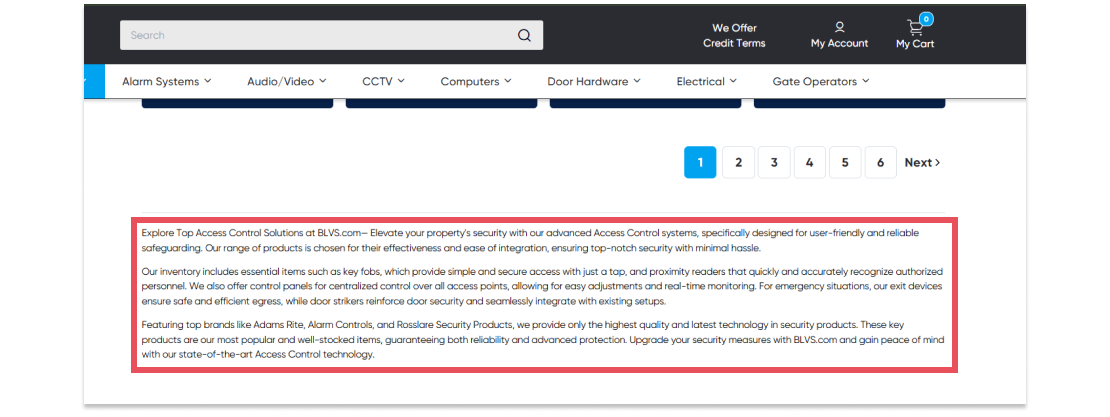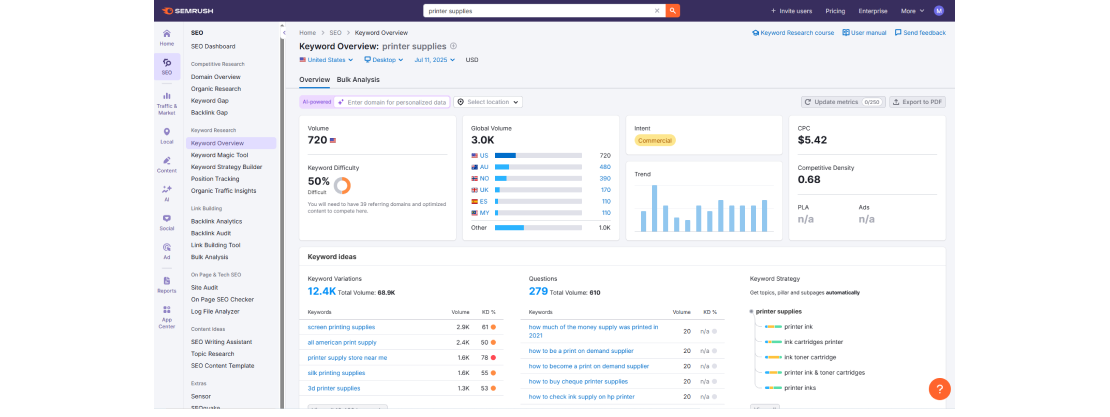
Have you ever wondered why your website isn’t showing up on Google, even after investing time and money into a great design and strong products? You’re not alone. Many small business owners feel frustrated when their online store looks professional but still doesn’t attract the customers they want. The truth is, just building a beautiful site isn’t enough if the right people can’t find you in search results.
This is where keyword optimization comes in. By aligning your website content with the exact terms and phrases your customers are searching for, you can start attracting more valuable organic traffic. Effective SEO keyword research helps ensure your site reaches the right audience, people ready to buy. If you’re looking for ways to boost your website traffic and turn more visitors into customers, mastering keyword optimization is the first step toward real results.
What Are Keywords and Why Do They Matter for Your Business?
Keywords are the words and phrases your business customers use when searching online for what they need. They’re not just for tech experts. In reality, keywords are the foundation of how real people and businesses find you on Google.
For example, if you sell office supplies to companies, your customers might search for “bulk printer paper supplier” or “commercial office furniture wholesale.” If you offer manufacturing equipment, buyers might type “industrial conveyor systems” or “B2B packaging machinery distributor.” These search terms are your keywords. They connect what you sell with businesses actively looking for your products.
Many believe keyword optimization means filling your website with as many search terms as possible. That’s a myth. Google and other search engines prefer websites that use keywords naturally and share valuable information. Simply adding keywords everywhere can hurt your rankings and make your site hard to read.
The best approach is to understand what your business customers search for and use those keywords naturally. This helps search engines see your expertise. It also makes it easier for potential clients to find you when they need your products or services.
How to Find the Right Keywords for Your Store
Start your keyword research with your own customers. Think about what they would type into Google to find your products or services. What questions do they ask? What problems do they want to solve? Use their language, not industry jargon.
You don’t need expensive tools to begin. Type your main product or service into Google. Watch the suggestions that appear as you type, this is called Google autocomplete. Check the “People also ask” section and the related searches at the bottom of the page. These show what your potential customers are actually searching for. Also, look at competitor websites. See what keywords they use on their main pages and product descriptions.
If you want to go further, several keyword research tools can help. Google Keyword Planner is a free tool that shows you how popular different search terms are. Ubersuggest, Semrush, and Surfer are also useful. They help you brainstorm keyword ideas, check how competitive certain terms are, and see what’s working for your competitors. These tools are user-friendly and offer actionable insights.
When you choose your keywords, bigger is not always better. Keywords like “office supplies” or “manufacturing equipment” get many searches. But they are much harder to rank for. Instead, look for more specific phrases, these are called long-tail keywords. Examples are “bulk printer paper supplier New Jersey” or “industrial conveyor systems for food processing.” Long-tail keywords attract the right visitors and give your site a better chance to stand out in search results.
Where to Use Keywords on Your Website
 Example of BLVS keyword optimized category description
Example of BLVS keyword optimized category description
Placing your keywords in the right places on your website makes a big difference. Focus on key spots that search engines and visitors both notice. These include your page titles, product descriptions, collection or category pages, FAQs, and blog posts.
For example, if you sell safety equipment to businesses, here’s how you might use a keyword in a product title:
- Before: Safety Gloves Model 423
- After: Cut-Resistant Safety Gloves for Industrial Work – Model 423
You can also add keywords to your product descriptions. Here’s a simple example:
- Before: This product is comfortable and reliable for workers.
- After: These cut-resistant safety gloves protect industrial workers in warehouses, factories, and construction sites.
Use keywords naturally in each spot. Search engines reward websites that write for people first, not robots. If you stuff your pages with keywords, repeating the same phrase over and over, it can actually hurt your rankings. Google is smart enough to know when content is unnatural or forced. Readers also notice when writing feels awkward or repetitive.
Being mindful of keyword placement and using them naturally helps your site look professional and trustworthy. Remember, you want your website to read like it was written for real customers, not just for search engines.
Common Mistakes Small Businesses Make with Keywords
- Stuffing too many keywords onto one page. Repeating “sustainable dresses” twelve times in a row doesn’t help, Google actually dings you for that, and your readers won’t enjoy it either. Instead, use keywords naturally, like you’re talking to a real customer.
- Ignoring long-tail keywords. Instead of just going after broad terms like “dresses” or “office supplies,” get specific. “Eco-friendly summer dresses for office wear” or “bulk printer paper supplier New Jersey” are examples of long-tail keywords that attract buyers who know exactly what they want.
- Forgetting about local searches. If your business serves a certain area, don’t miss out on terms like “boutique near me” or “industrial equipment distributor in Dallas.” Local keywords help connect you with customers ready to buy in your region.
- Only focusing on your homepage. If you only add keywords to your homepage, you’re leaving out all your product pages, categories, and FAQs. Every important page deserves some keyword love, spread it out to get found for more searches.
- Not keeping a blog. Skipping a blog means missing out on lots of keyword opportunities. A good blog lets you answer common questions, share tips, and appear in search results for topics your customers care about.
How to Track What’s Working (Without Getting Overwhelmed)
Tracking the results of your keyword optimization doesn’t have to be complicated or expensive. Two of the best tools are actually free: Google Search Console and Google Analytics. Google Search Console helps you see which keywords are bringing people to your site, how often your pages appear in search results, and how many times people click through to visit. Google Analytics goes a step further, showing how visitors behave once they land on your site, like which pages they view, how long they stay, and whether they take actions such as filling out a form or making a purchase.
As you monitor these results, focus on a few key signs of progress. Are you getting more clicks from search over time? Are people spending longer on your site and checking out more pages? Small improvements in these areas mean your keyword strategy is working. Remember, SEO is a long-term investment. It’s normal for changes to take several weeks or even months to show real results. Stay patient and keep making small, steady improvements, over time, you’ll see your website traffic and search rankings grow.
When to Get Expert Help (and How to Avoid Getting Burned)
Sometimes, doing keyword optimization on your own gets you part of the way, but there are signs it might be time for professional help. If your website traffic has flatlined, or you’re seeing technical issues you can’t fix, it may be time to call in an expert. Maybe you’ve tried everything you can think of and still aren’t getting found in search results. Or you feel stuck every time you try to use new tools or strategies. There’s no shame in reaching out, every business hits a wall sometimes.
A good agency will always speak to you in plain English. They’ll explain what they’re doing and why, lay out a clear, step-by-step plan, and never promise overnight results. Look for a team that talks about real strategy, not quick fixes or guarantees they can’t keep.
Next Steps: Quick Wins You Can Try Today
You don’t have to overhaul your whole website to start seeing results from keyword optimization. There are a few quick wins you can try right now. Start by picking one important page, maybe a top-selling product or your main service page, and review the content. Make sure your most important keyword appears naturally in the page title, first paragraph, and at least once more on the page. Check that the keyword makes sense in context and isn’t forced. Next, try using Google autocomplete to find a new, specific keyword related to your business and add it to a product or FAQ page. Update an image’s alt text to include a keyword if it fits. Finally, look at your competitors’ sites to see which keywords they use and consider ways to improve your own content.
If you’re ready to go further, download our free keyword optimization checklist or request a complimentary site audit from MAKDigital. Our team can show you where you stand and offer easy-to-follow recommendations to boost your visibility in search.
Conclusion
Effective keyword optimization is the foundation of getting your business noticed online, but it’s not always easy to know where to start or how to get the best results. At MAKDigital, we specialize in helping businesses like yours cut through the confusion and implement keyword strategies that actually drive growth. Whether you’re looking for a comprehensive keyword research plan, a detailed SEO audit, or ongoing support to keep your site performing at its best, our team is here to help.
If you’re ready to attract more of the right customers and see measurable improvements in your search rankings, let’s talk. Contact MAKDigital today for a free consultation or to schedule an SEO audit tailored to your business. Take the guesswork out of SEO—and start seeing the real results you deserve.

 Eashan Mehta
Eashan Mehta






